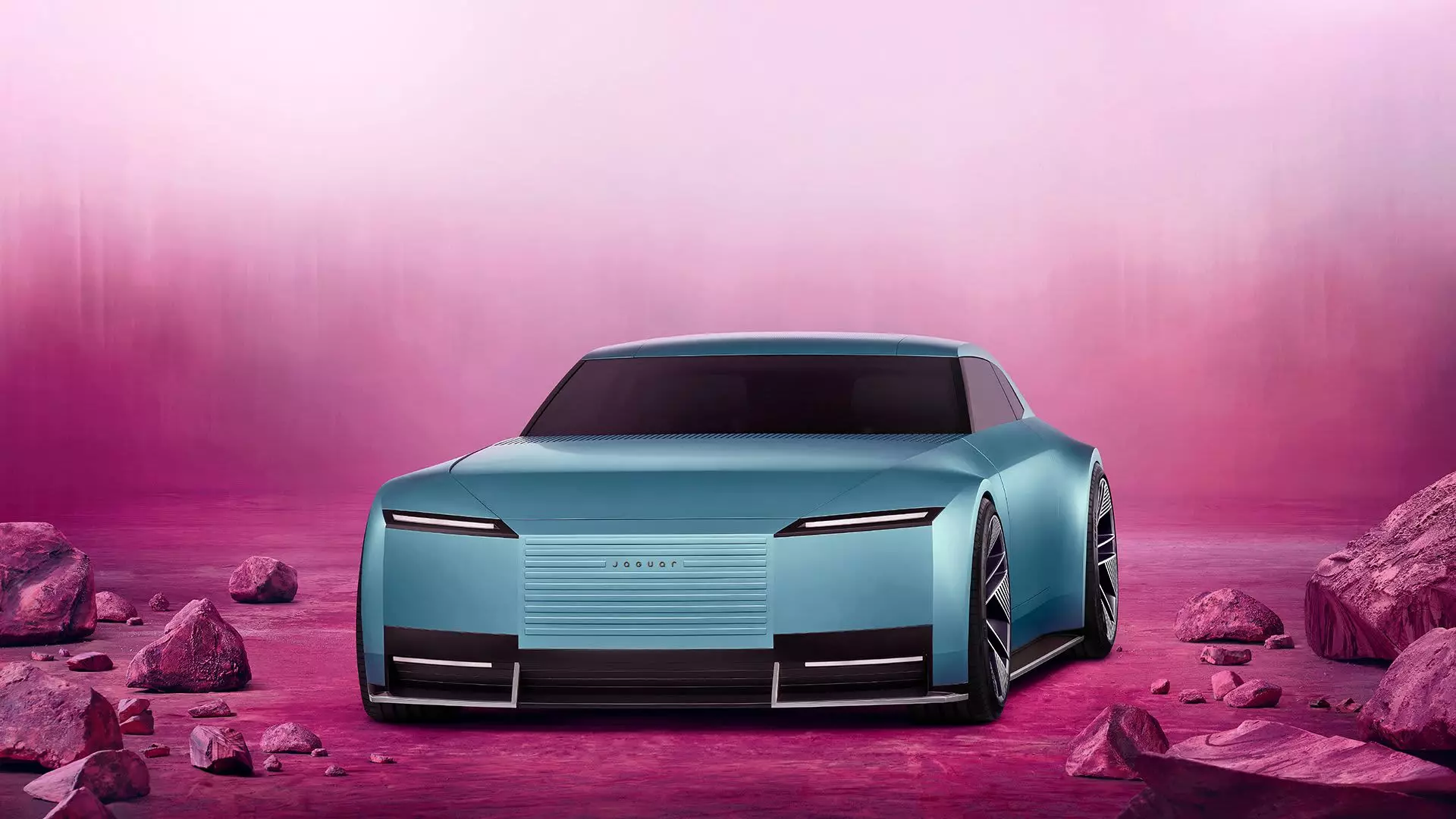Jaguar, a storied name in British automotive history, has taken a significant step into the future of mobility with the unveiling of its new electric vehicle concept, the “Type 00.” This bold initiative signifies not just a new vehicle but a potential overhaul of Jaguar’s identity in an ever-changing automotive landscape. The Type 00, pronounced “Type Zero Zero,” stands out distinctly with its cutting-edge design that balances minimalism with a touch of flamboyance. In this era of electric vehicle (EV) evolution, the Type 00 reflects Jaguar’s ambition to redefine itself for modern consumers.
One of the most striking aspects of the Type 00 is its departure from the sleek lines and sporty aesthetics that have historically characterized Jaguar vehicles. Instead, the design is notably boxy, featuring prominent, sleek lighting elements and larger wheels that lend it a robust appearance. While the automaker has long been revered for its classic and sporty cars, the Type 00 represents a paradigm shift towards a more utilitarian form that may attract a new base of environmentally conscious consumers. This radical move challenges preconceived notions about luxury vehicles, as the Type 00 aligns more with functional design principles commonly seen in the EV market today.
The Concept’s Purpose
Concept vehicles have long been a staple in the automotive industry, serving as both a testing ground for new ideas and a showcase for future designs that might influence consumer interest. Jaguar’s introduction of the Type 00 aligns with this tradition; however, the stakes appear markedly higher. As Jaguar aims to navigate a pivotal transformation into electric vehicle production, the Type 00 embodies the spirit of innovation that the company seeks to project in its rebranding campaign. While not intended for immediate sale, the vehicle’s design is a vital component in determining the direction of future Jaguar models, hinting at an ambitious plan to roll out several electric cars in the coming years.
Jaguar’s commitment to the electric vehicle market is underscored by impressive performance specifications. The brand has asserted that its forthcoming EV lineup, similar to the Type 00, will boast an impressive range of up to 430 miles per charge. Furthermore, the promise of 200 miles of range achieved in just 15 minutes of rapid charging reveals Jaguar’s intent to compete with established industry leaders. This emphasis on advanced performance metrics is crucial, especially as consumers become increasingly precise in their expectations for electric vehicles.
Jaguar’s recent decisions have not been without controversy. The company recently launched a high-profile advertisement campaign heralding its rebranding under the slogan “Copy Nothing.” The campaign has, however, drawn criticism online, particularly regarding the potential alienation of long-time enthusiasts. Social media commenters have harshly criticized the removal of the iconic jaguar logo, a long-standing emblem that has defined the brand since the mid-20th century. Critics have termed the shift as “woke” and emblematic of a brand that is losing touch with its heritage. Nonetheless, Jaguar has maintained that this bold rebranding is necessary for its evolution. Managing director Rawdon Glover emphasized that to thrive, Jaguar needs to recalibrate its image for a new consumer base, moving away from traditional automotive stereotypes.
The Path Ahead: A Transition Amidst Challenges
As Jaguar predetermines its course toward becoming a fully electric company by 2026, it confronts an industry rife with challenges. The automotive sector is observing a clear shift toward EVs, yet initial adoption rates have often fallen short of estimates. In a bold move last November, Jaguar halted all new car sales in the U.K. This decision not only highlights the urgency of its transition but also signifies the complexities involved in fully committing to an electric future. With the automotive market landscape changing rapidly, Jaguar’s transformation must be nimble to adapt during this pivotal period.
Jaguar’s Type 00 concept is more than just a showcase of innovative automotive technology; it marks the beginning of a significant chapter in the brand’s history. By embracing a radically different design and committing to a future grounded in electric vehicle technology, Jaguar is keen to assert its relevance in an increasingly evolved market. As the brand attempts to merge its luxury identity with the demands of a new generation of drivers, it will be interesting to see how these strategic decisions unfold in the coming years.

